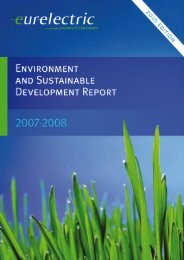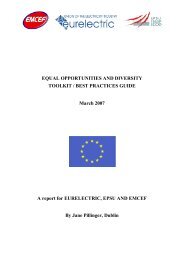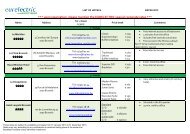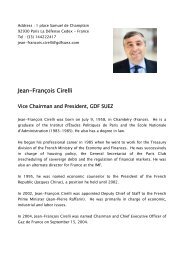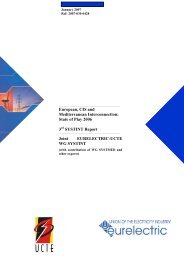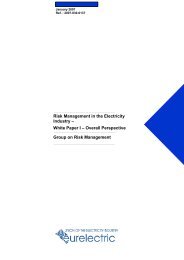Activity Report 2012 - Eurelectric
Activity Report 2012 - Eurelectric
Activity Report 2012 - Eurelectric
Create successful ePaper yourself
Turn your PDF publications into a flip-book with our unique Google optimized e-Paper software.
Allan BAkER is Managing Director – global<br />
Head of Power at Société Générale. As such,<br />
he has long experience in analysing investment<br />
opportunities in the power sector, and was<br />
involved in the work on EURELECTRIC’s<br />
Investment Action Plan. He shares with us<br />
the financier’s perspective.<br />
Would you say that Europe has an oversupply in<br />
power, and that there is thus no need for investment?<br />
The analysis of European power markets is becoming<br />
increasingly complicated. In some regions there is<br />
significant oversupply, due to overbuild of new thermal<br />
capacity, rapid development of renewable energy capacity,<br />
grid constraints and of course economic slowdown. But,<br />
as always, there are exceptions. Certain markets, for<br />
instance the UK, have an evident need for investment<br />
in new capacity but regulatory uncertainty is making it<br />
difficult to determine in what parts of the market to invest.<br />
In other regions there is a clear need for investment in<br />
flexible capacity but the price signals to underpin this<br />
investment are not always in place.<br />
What is the reason for the turmoil in the European<br />
power industry today?<br />
It is true that we are currently seeing the most fundamental<br />
change in many European power markets since the “dash<br />
for gas” in the 1990s. This process is driven by many<br />
factors, not least the move to low-carbon generation in<br />
response to the legally binding EU emissions targets.<br />
This, together with other factors, is driving extensive<br />
market review and reform. In this context, various markets<br />
are implementing or considering capacity payment mechanisms<br />
to ensure capacity is kept available, adding<br />
another complicating factor to an already complicated<br />
landscape. So rather than turmoil, I would say that we are<br />
facing a necessary period of fundamental market change<br />
to ensure that the current policy objectives for European<br />
power can be met, whilst maintaining security of supply.<br />
How would you describe today’s investment climate<br />
for power generation in Europe?<br />
Despite the apparent upheaval in the European power<br />
markets there is still considerable investment interest<br />
interview<br />
Many investors appear to be sitting<br />
on their hands<br />
in the region, particularly from Asian investors. Many of<br />
the traditional utilities are facing significant investment<br />
needs which are driving them to adapt business models,<br />
thus opening up opportunities. External factors, including<br />
the availability of financing, are also having an impact<br />
on the investment climate. Liquidity is still available,<br />
but it is clearly more limited. It is also evident that both<br />
European and non-European investors are concerned<br />
about the regulatory and political risk associated with<br />
the changing markets and the stresses caused by rapidly<br />
increasing costs of renewable subsidies. Despite the<br />
perceived opportunities, many investors therefore appear<br />
to be sitting on their hands waiting for some clarity.<br />
What are ways out? What is needed to improve the<br />
investment climate?<br />
Improving the investment climate for the European<br />
generation sector depends, in my view, on economic<br />
factors and on policy/regulatory factors. Economic<br />
recovery and growth is a medium-term factor and<br />
could be slow to materialise. But regulatory and policy<br />
clarity is within the control of national and European<br />
authorities. All players in the market, be they existing<br />
utilities, external financial or industrial investors and<br />
financial institutions, need confidence in the regulatory<br />
and policy landscape to take investment decisions. In<br />
the end, capital is mobile: unless investors are confident<br />
that they can earn an appropriate return, they will deploy<br />
their capital in other markets. Of course markets and<br />
regulation/policy must adapt to changing circumstances.<br />
But proper management of this change is crucial to<br />
maintaining a positive investment climate. Clarity and<br />
consistency are key.<br />
How would you assess the EURELECTRIC Investment<br />
Action Plan?<br />
The Investment Action Plan is a good analysis of where<br />
European generation currently stands and the challenges<br />
the industry faces. It makes some strong and coherent<br />
recommendations for dealing with these challenges<br />
where possible. There is general agreement that substantial<br />
investment will be required within the next 10<br />
years. In a rapidly changing environment we now have<br />
an opportunity to ensure that the European utility sector<br />
remains attractive. My view is that the EURELECTRIC<br />
Investment Action Plan makes a valuable contribution<br />
to this process and the surrounding debate.<br />
15



